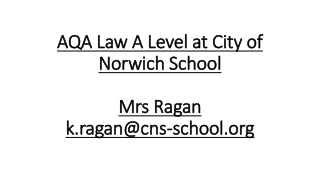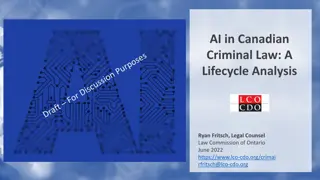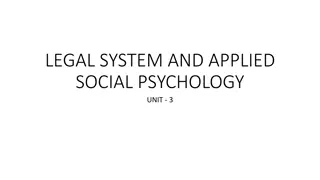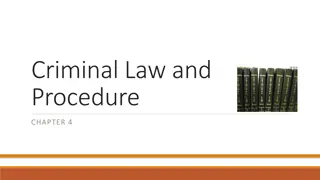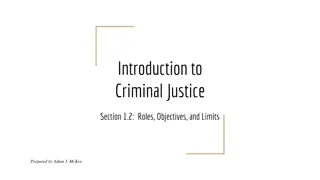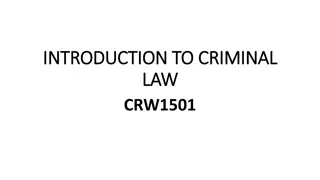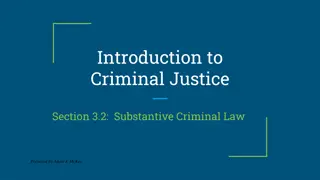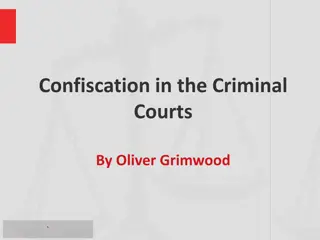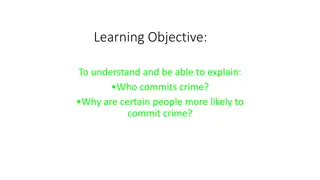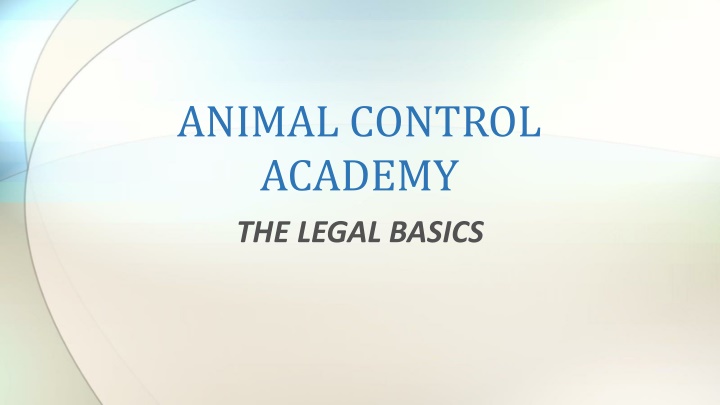
Animal Control Academy: Understanding Legal Basics
Explore the legal system essentials for animal control officers, including where to find relevant laws, roles within the criminal justice system, types of evidence you can gather, and protections against unlawful searches and seizures.
Download Presentation

Please find below an Image/Link to download the presentation.
The content on the website is provided AS IS for your information and personal use only. It may not be sold, licensed, or shared on other websites without obtaining consent from the author. If you encounter any issues during the download, it is possible that the publisher has removed the file from their server.
You are allowed to download the files provided on this website for personal or commercial use, subject to the condition that they are used lawfully. All files are the property of their respective owners.
The content on the website is provided AS IS for your information and personal use only. It may not be sold, licensed, or shared on other websites without obtaining consent from the author.
E N D
Presentation Transcript
ANIMAL CONTROL ACADEMY THE LEGAL BASICS
WHERE CAN I FIND THE LAW? Constitution United States Constitution Washington Constitution* Case Law United States Supreme Court Washington State Supreme Court & Court of Appeals Revised Code of Washington (RCW)* Washington State Court Rules Superior Court Criminal Rules (CrR) Criminal Rules for Courts of Limited Jurisdiction (CrRLJ) City Municipal Codes (_MC)*
ROLES WITHIN THE CRIMINAL JUSTICE SYSTEM EVIDENCE GATHERING Animal Control Police Officers REVIEWING + LITIGATING Prosecutors Defense Attorneys DECISION MAKING Judge Jury
WHAT TYPES OF EVIDENCE CAN I GATHER? 911 calls Witness + defendant statements Video, audio, and/or photo evidence Veterinary reports Animals themselves may need a warrant first Literally anything included in a search warrant
LAW PROTECTS AGAINST UNLAWFUL SEARCH AND SEIZURES UNITED STATES CONSTITUTION FOURTH AMENDMENT The right of the people to be secure in their persons, houses, papers, and effects, against unreasonable searches and seizures WASHINGTON STATE CONSTITUTION ARTICLE 1 No person shall be disturbed in his private affairs, or his home invaded, without authority of law
WHY SHOULD WE CARE? YOU=the government/state CITIZENS=have a right to privacy If you seize a citizen and search them, their stuff, their house, their yard, their animals, etc you better have a lawful reason. Consequences LAWSUITS Evidence gets suppressed case dismissed Criminals go unpunished Media coverage Discipline within department Prosecutors unhappy
CHAPTER 3: SEIZURES FACTORS TO DETERMINE WHETHER A SEIZURE OCCURRED SEIZURE EXCEPTIONS TERRY STOP SOCIAL CONTACT COMMUNITY CARETAKING FUNCTION
WHAT IS A SEIZURE? Unofficial definition: (1) stopping a person or (2) taking/collecting of property. Official definitions: When a government employee, by physical force or by show of authority, restrains an individual s freedom of movement. Standard: would a reasonable person feel free to disregard the officer and go about his/her business?
When am I allowed to Seize Property Search warrant more on this later Consent Abandoned property
When can I seize property? Consent Make sure that it truly is voluntary. If inside a home = Ferrier Warnings Don t exceed the scope of consent Ferrier Warnings: 1. You have the right to refuse to consent. 2. If you consent to the search, you have the right to withdraw the consent at any time. 3. You have the right to limit the scope of the consent to certain areas of the premises or vehicle. 4. Evidence found during the search may be used in court against you or any other perosn
When can I seize property? Consent Hypo ACO Bob gets a call from a concerned citizen who claims that his neighbor Ned is engaging in dog fighting and has a whole bunch of dog fighting paraphernalia in his home. ACO Bob goes to Ned s home. How should he proceed? Ned has a roommate named Ted. Ted s room is unlocked. Ned says that ACO Bob can take a look. Should ACO Bob proceed?
When can I seize property? Consent -- Tricky Consent Children Landlord Roommates Houseguest Hotel Management
When can I seize property? Abandoned Hypo: Criminal is being arrested outside. He takes off jacket and puts on the roof of the patrol car. Can officers search? Abandoned lost/mislaid
When can I seize property? Consent Property=Public v. Private* What is public? Factors Location Duration Item type Hypos--- Suspect carrying a purse or backpack? Suspect s jacket pocket? Item in vehicle Item on porch Item in trash for pickup
When can I seize property? Property in Private* Officer may seize property located on private property if Officer is allowed to be where the property is; and Item is immediately recognized as contraband or as having some evidentiary value Hypo: Walk up on porch = mail man rule Walk into backyard Item in the back seat of vehicle during a traffic or criminal stop
WHEN AM I ALLOWED TO SEIZE A PERSON? 1) Arrest Warrant 2)Probable Cause Standard: based on the totality of the circumstances, the officer has sufficient facts to lead a reasonable and cautious person to conclude that there is a probability that the defendant is involved in criminal activity. Takes into consideration an officer s expertise and experience. To arrest=crime must occur in front of you, unless felony Or 3) Exception Applies
Seize a Person: Arrest Warrant Do they have one? Can I get one?
Seize a Person: Probable cause for crime* Felony = rely on other people / physical evidence Misdemeanor = rely on just yourself. Must have seen it! ACO scan t directly arrest.
Exceptions Social contact Terry stop Community caretaking
SOCIAL CONTACT Law enforcement allowed to converse with citizens, just like everyone else. Can approach people in cars, knock on people s doors, visit person at work. No seizure if citizen freely and voluntarily participates in the conversation. Can contain an investigative component. Test: would a reasonable person feel free to terminate the encounter and walk away.
Hypo ACO Boucher is on patrol at the local park. She sees a woman with a dog who looks emaciated and unwashed. ACO Boucher subjectively wants to speak to the person to investigate for animal cruelty in the second degree. She goes up to the woman and does the following: Picks up the dog, but ACO Boucher does not take the leash away from the owner. Social contact? Asks the woman for ID and takes ID to patrol car to run name. Social contact? Tells woman to wait for a responding officer. Social Contact?
Terry Stop Have reasonable and articulable suspicion that the person has engaged in or is engaging in criminal conduct Purpose is to investigate possible criminal activity Must be brief and minimally intrusive, but if you are gathering more evidence of a crime, then you can prolong the intrusion. Report writing matters!
Hypo ACO Boucher receives a call from a concerned citizen, Eric. Eric was visiting his friend, Joe, and saw some items that concerned him. He saw that his friend s basement had a bunch of benches surrounding a large pen. Inside the large pen were empty cages with feathers. ACO Boucher responds to the home and sees Joe walking on the sidewalk away from her vehicle. ACO Boucher asks Joe to stop but he ignores her. Can ACO Boucher stop Joe?
Community Caretaking Law enforcement allowed to respond to individuals requesting assistance. (Example 911 calls and individuals flagging down police). Law enforcement allows to assist vulnerable populations. Potential victim of violent crime may enter and remain to eliminate the concern that a victim is in danger Intoxicated pedestrians may transport to safety if moving along public roadway. Children may transport and call CPS if child is in danger Mentally ill may transport to hospital if reasonably believe that the person presents an imminent likelihood of serious harm or is in immiment danger. Welfare checks go to person s residence to check on them (typically DV related or at request of friend or family member).
Overview Seizure Pulling over a vehicle Blocking a vehicle or person s exit Activating sirens or lights Giving commands (ex. Stop, don t move, come talk to me). Use of weapons and/or handcuffs Taking someone s property, including ID Following a person after they say they won t speak with you Number of law enforcement officers Telling someone that they are under arrest Not A Seizure Parking your vehicle away from person s vehicle Making requests (ex. Can I talk to you? Do you mind coming over here? Can I come inside and speak to you?, etc). Informing the person that they are not under arrest Terry stop Social contact Community caretaking
WHAT IS A SEARCH? Official definition: a search occurs when the state intrudes upon an area where a person has a legitimate reasonable expectation of privacy. What is considered reasonable? 1) person must subjectively believe that thing/place is private; and 2) Society recognizes that thing/place is private Examples persons, houses, papers, effects, vehicles, property, blood, shed, gardens
WHY SHOULD WE CARE? Exclusionary rule illegally obtained evidence is not admissible in court. Fruit of the poisonous tree everything following is not admissible in court. YOU CAN BE CHARGED without a warrant or an exception to the warrant requirement, it is unlawful to search a residence.
WHEN CAN I SEARCH? WITH A WARRANT IF A WARRANT EXCEPTION APPLIES
WHAT IS A SEARCH WARRANT? Beautiful pieces of paper Affidavit in support of search warrant Search Warrant Return of Service Signed by Judge Directs law enforcement to search person, place, or thing Directs law enforcement to seize evidence Directs law enforcement to write out a list what they seized and to file that paperwork with the court within a specific time frame
WHO CAN REQUEST A SEARCH WARRANT? HOW? Who can request? How? Write an affidavit in support of search warrant. Write actual search warrant Write Return of Service Take to Judge (in person or email/telephonic) Submit to oath Get Judge to sign Peace officer Prosecuting Attorney
WHO CAN ISSUE SEARCH WARRANTS? Justice of the Supreme Court (good luck with that!) Judges of the Court of Appeals (same) Superior Court Judges and Commissioners (felony) District Court Judges and Municipal Court Judges Pro Tem Judges (same powers as who they are substituting for)
WARRANT REQUIREMENTS Specify the Place/Person/Object that you want to search. List Crime(s)Under Investigation Describe the type of search Evidence of crime; Contraband, fruits of crime, things otherwise criminally possessed Weapons or other things by means of which a crime has been committed or reasonably appears to be committed Summarize your qualifications Summarize your investigation so far (establish PC for crimes) Summarize why you think the place/item to be search has relevant evidence (establish nexus) List the evidence that you want to seize Penalty of Perjury Language
Hypo Sexually abused dog inside of a home. Your evidence includes a relative of the defendant who said that she walked in on D anally raping the dog. She also read his diary which is located in his bedroom. The diary describes his sexual acts. She also has a sneaking suspicion that there might be animal porn on his computer. What evidence do you want? How do you get it?
HOW TO SERVE A SEARCH WARRANT? Law enforcement officer must serve (ACO can assist) Knock and Announce = required for service of a warrant. May break open any door, window, or enclosure of a dwelling or building if refused entry after doing the following: Must have warrant (provide copy to person if present or leave on counter or front door if no one present) Announce identity Demand admittance State purpose of demand Wait (30 seconds is usually ok, can be sooner if hear furitive activity, signs of danger, or destruction of evidence). Be explicitly or implicitly denied admittance
HOW TO SERVE A SEARCH WARRANT? ANIMAL CONTROL SPECIFIC PICTURES BEFORE MOVING ANYTHING!!! System for labelling animals (hoarder example) Health precautions Control scene prevent tampering of crime scene LAW ENFORCEMENT if person obstructs service of search warrant, officer should arrest for obstruction. Only can search and seize items listed in search warrant If inadvertently find other evidence, back away immediately, control scene, apply for supplemental search warrant. Animals vet impound Inventory = must be performed in front of another individual (another officer is sufficient) Return inventory within time frame
EXCEPTIONS TO THE SEARCH WARRANT REQUIREMENT Consent make sure it s voluntary and person has authority to consent Plain view contraband of evidence but that item must be located where ACO is allowed to be. Search incident to arrest arrest must be lawful. Canine sniff Inventory search have police do this

